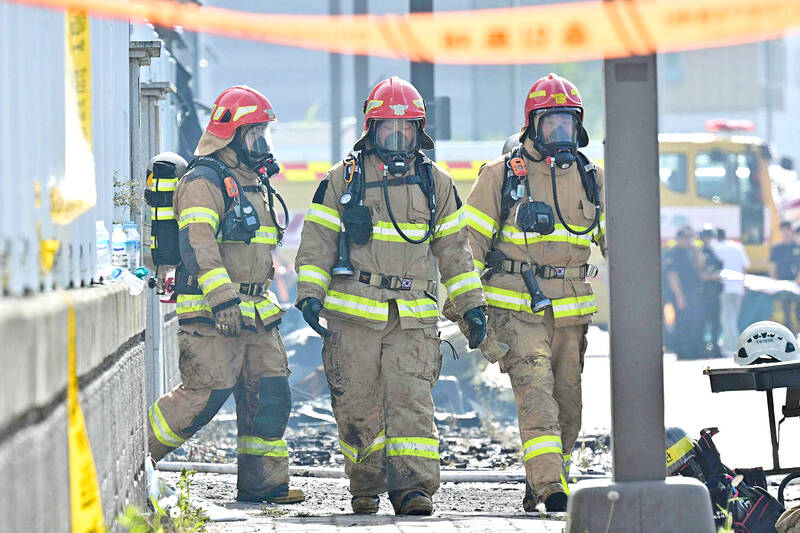Twenty-two people were killed — including 18 Chinese nationals — in a massive fire at a South Korean lithium battery factory, the fire department said yesterday, one of the nation’s worst factory disasters in years.
More than 100 people were working in the factory when workers heard a series of explosions from the second floor, where lithium-ion batteries were being inspected and packaged, firefighter Kim Jin-young told media.
In the massive blaze that ensued, 22 people were killed, including 20 foreign nationals — 18 Chinese, one from Laos and one of unknown nationality, he said.

Photo: AFP
“Most of the bodies are badly burned so it will take some time to identify each one,” he added.
Firefighters are still searching for one more person who remains unaccounted for, he said, adding that they had managed to contain the largest blaze at the plant and get inside.
Firefighters were “doing cooling operations to prevent the fire from expanding to nearby factories,” Kim said.
Dozens of fire trucks were lined up outside the factory, an Agence France-Presse reporter saw, with rescue workers carrying bodies, covered by blue blankets, out of the building on stretchers.
Images shared by Yonhap after the fire broke out showed huge plumes of billowing gray smoke rising into the sky above the factory, with orange flames inside the building.
The vast factory had an estimated 35,000 battery cells on the second floor in storage, with more batteries stored in other areas.
Lithium batteries burn hot and fast, and are difficult to control with conventional fire extinguishing methods.
“Due to fears of additional explosions, it was difficult to enter,” Kim said, describing the tricky rescue operation.
“As it is a lithium battery manufacturer, we [had] determined that spraying water will not extinguish the fire, so we [used] dry sand,” he added.
The lithium battery plant is owned by Aricell, a South Korean primary battery manufacturer in the city of Hwaseong, just south of the capital, Seoul.
Shares of Aricell’s parent company, S-connect, plunged by more than 20 percent on the Seoul exchange yesterday. S-connect owns 96 percent of Aricell.
Lithium batteries are used in everything from laptops to electric vehicles — but can be highly explosive, with airlines, for example, imposing strict regulations on checking devices containing them.
South Korean President Yoon Suk-yeol issued emergency instructions to authorities, telling them to “mobilize all available personnel and equipment to focus on searching for and rescuing people,” his office said.
The president also warned authorities that they should “ensure the safety of firefighters considering the rapid spread of fire.”
Authorities in Hwaseong sent out a series of alerts to residents warning them to stay inside.
“There is a lot of smoke due to factory fires. Please pay attention to safety, such as refraining from going out,” one alert sent by text message said.
“Factory fire. Please detour to surrounding roads and nearby citizens please close windows,” another one read.
South Korea is a major producer of batteries, including those used in electric vehicles. Its battery makers supply EV makers around the world, including Tesla.
The fire is one of South Korea’s worst factory disasters in years.
Previously, its worst chemical plant accident was in 1989 at the Lucky Chemical factory in Yeosu, Southern Jeolla Province, which killed 16 people and injured 17.
A fire at a warehouse in Icheon in 2020 killed 38 people.

A fire caused by a burst gas pipe yesterday spread to several homes and sent a fireball soaring into the sky outside Malaysia’s largest city, injuring more than 100 people. The towering inferno near a gas station in Putra Heights outside Kuala Lumpur was visible for kilometers and lasted for several hours. It happened during a public holiday as Muslims, who are the majority in Malaysia, celebrate the second day of Eid al-Fitr. National oil company Petronas said the fire started at one of its gas pipelines at 8:10am and the affected pipeline was later isolated. Disaster management officials said shutting the

US Vice President J.D. Vance on Friday accused Denmark of not having done enough to protect Greenland, when he visited the strategically placed and resource-rich Danish territory coveted by US President Donald Trump. Vance made his comment during a trip to the Pituffik Space Base in northwestern Greenland, a visit viewed by Copenhagen and Nuuk as a provocation. “Our message to Denmark is very simple: You have not done a good job by the people of Greenland,” Vance told a news conference. “You have under-invested in the people of Greenland, and you have under-invested in the security architecture of this

Japan unveiled a plan on Thursday to evacuate around 120,000 residents and tourists from its southern islets near Taiwan within six days in the event of an “emergency”. The plan was put together as “the security situation surrounding our nation grows severe” and with an “emergency” in mind, the government’s crisis management office said. Exactly what that emergency might be was left unspecified in the plan but it envisages the evacuation of around 120,000 people in five Japanese islets close to Taiwan. China claims Taiwan as part of its territory and has stepped up military pressure in recent years, including

UNREST: The authorities in Turkey arrested 13 Turkish journalists in five days, deported a BBC correspondent and on Thursday arrested a reporter from Sweden Waving flags and chanting slogans, many hundreds of thousands of anti-government demonstrators on Saturday rallied in Istanbul, Turkey, in defence of democracy after the arrest of Istanbul Mayor Ekrem Imamoglu which sparked Turkey’s worst street unrest in more than a decade. Under a cloudless blue sky, vast crowds gathered in Maltepe on the Asian side of Turkey’s biggest city on the eve of the Eid al-Fitr celebration which started yesterday, marking the end of Ramadan. Ozgur Ozel, chairman of the main opposition Republican People’s Party (CHP), which organized the rally, said there were 2.2 million people in the crowd, but